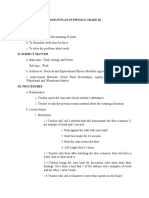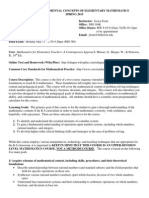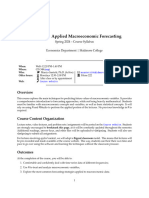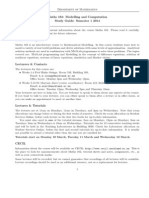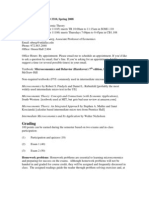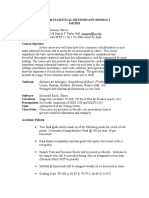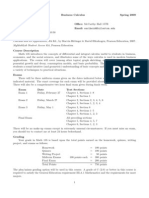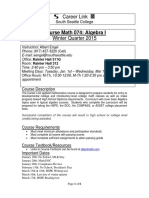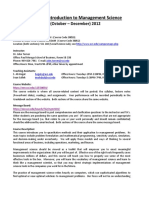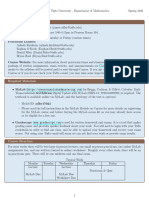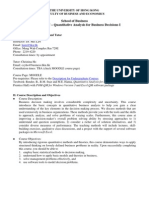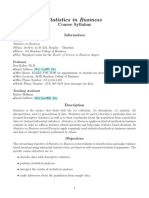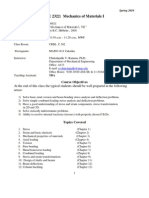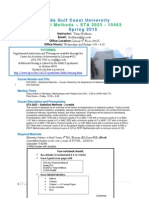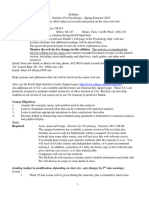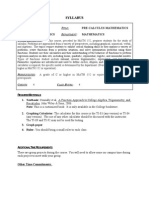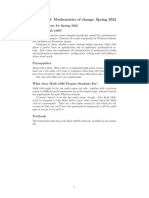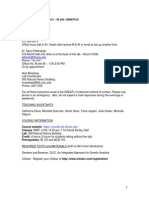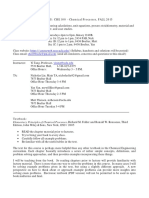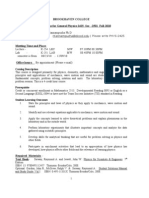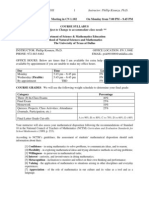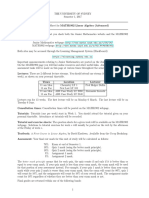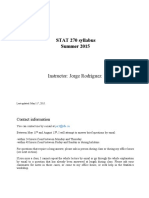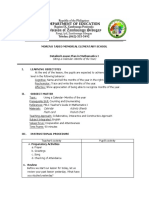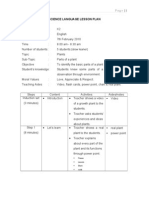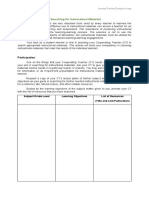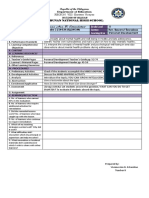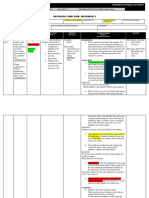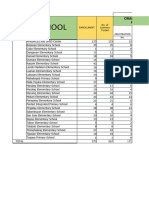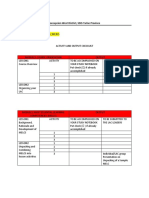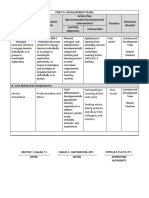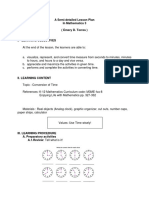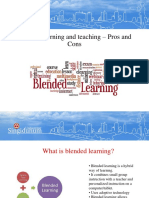(Sp2020) Math 98 - 1A Adjunct Syllabus - Aganagic
(Sp2020) Math 98 - 1A Adjunct Syllabus - Aganagic
Uploaded by
merkeltCopyright:
Available Formats
(Sp2020) Math 98 - 1A Adjunct Syllabus - Aganagic
(Sp2020) Math 98 - 1A Adjunct Syllabus - Aganagic
Uploaded by
merkeltOriginal Description:
Original Title
Copyright
Available Formats
Share this document
Did you find this document useful?
Is this content inappropriate?
Copyright:
Available Formats
(Sp2020) Math 98 - 1A Adjunct Syllabus - Aganagic
(Sp2020) Math 98 - 1A Adjunct Syllabus - Aganagic
Uploaded by
merkeltCopyright:
Available Formats
Math 98: Adjunct for Math 1A
Spring 2020 (1-Unit, P/NP)
Faculty: Professor Aganagic
MWF 12-1 106 Moffitt
MWF 2-3 155 Kroeber
Instructor Information
Hieu Nguyen (hieu.nguyen@berkeley.edu)
Office: 102A Chavez
OH: Week 1: Wednesday: 1 pm –2 pm, 4:30 pm – 7 pm.
Thursday: 12 pm – 2 pm, 5:30 pm – 7 pm.
Friday: 1 pm –2 pm, 3 pm – 4:30 pm
(Office hours are in our office or in Drop-In Tutoring and
are subject to change)
Website: http://slc.berkeley.edu/math-1a
Course Description
Math 98 is designed to assist you in developing effective study strategies for quantitative reasoning courses. This
is accomplished through direct application of study strategy skills to the material covered in your main lecture
course. All of the work is geared towards assisting you in successful completion of your math course, and to
develop your quantitative reasoning skills and study strategies so that you are prepared for the rest of your studies
at the university. Please note that while much of the course will be dealing with content from your lectures and
discussion sections, this material is designed to supplement your regular course, not as a replacement.
By the completion of Math 98, students will have:
• Developed quantitative reasoning skills for success at the university level.
• Learned time management and study skills as an ongoing process.
• Established techniques for reading and analyzing mathematical writing (such as your textbook)
• Developed effective note-taking skills.
• Developed and applied mathematical intuition and problem-solving skills.
• Established collaborative and cooperative learning skills, and recognized their importance
• Practiced the analysis and solution of complex problems.
• Practiced and developed strategies to use in preparing for and taking examinations.
Enrolling in Math 98
Students get the course number for Math 98 in week 3 (2/03 – 2/07) after completing the following 6 items:
1. Take the entrance assessment. The score does not matter. However, I will grade it and you have to correct
any mistakes. Correction is due Wednesday 1/29 at 6 pm.
2. Fill in the in-take form here by 9 am, Monday 1/27.
3. Take and correct Quiz 1 (given on Monday 1/27 – correction is due Monday 2/03 at 7 pm).
4. Take Quiz 2 (given on Friday 1/31 – correction is due Thursday 2/6 at 7 pm)
5. Take Quiz 3 (given on Wednesday 2/5 – correction is due Wednesday 2/12 at 7 pm).
6. Attend all 3 hours weekly of the adjunct course. If you have an excused reason to miss a class, you must
inform me and make sure your excuse is approved by me. In addition, you will need to make up the work
that you would miss that day.
There are no auditors in Math 98, so you must officially enroll to be in this course.
Faculty sponsor: Professor Olga Holtz, Math Department
Sponsoring Departments: Student Learning Center and Mathematics Department
Course Policies
Math 98 is a 1-unit pass/not pass course. A 70% is required to pass the course. The grade breakdown is as
follows:
• Participation 5% • Quizzes 25% • Midterm 2 20%
• Homework 5% • Midterm 1 20% • Final Review 25%
Attendance policy: Attendance is mandatory. In order to enroll, you need to attend through the third week of the
semester. After that point, you will be allowed 1 (one) unexcused absence during the semester. Additional
unexcused absences will result in the loss of 2% of your course grade. Excused absences are those resulting from
illness, family emergency, etc. and you must inform me beforehand (or provide documentation). Note that
classes missed due to other courses (papers due, etc) are NOT excused absences.
Course Components:
Participation: Each week we will spend some time working in groups on worksheets covering that week’s lecture
material. You will be expected to participate with your group in solving problems and you may be asked to
present selected problems to the class. See this as a chance to master the material in the course. Participation in
the course requires reasonable progress on each of the worksheets. These are not regularly handed in (though
some problems not covered in class may be assigned as homework). (5% of Grade)
Homework: Periodically, I will assign homework assignments, such lecture note assignments, study strategies
exercises, or even extra problems. Each assignment will be closely geared towards helping you succeed in your
main lecture course and beyond. (5% of Grade)
Quizzes/Quiz Corrections: About every week, except on exam weeks, there will be quizzes, as a way to help
assess your competence with the material. Additional quizzes may be used to aid in preparing for exams, or to
work on particularly important topics. These quizzes will give you a realistic idea of how you’re doing in the
course. You will have the opportunity to correct your quizzes. (25% of Grade)
Midterm Exams: Your midterm exam grades will consist of two parts: the adjunct midterm review assignment
and a post-exam conference to assess and discuss your midterm exam.
(20% of Grade for Each Midterm)
• The adjunct midterm review assignments are handed out about a week before your lecture exam, and are used
to assess your abilities leading into the exam. This is a chance to assess your general exam preparedness,
including mastery of exam level material, test taking strategies (including time management on the test and
test pressure), and areas needing more study. Students are encouraged to meet with the instructor if there are
any parts of the assignment that are particularly difficult, or if there are concerns about test anxiety, time
pressure, etc.
• After the lecture exam, each student is required to conference with their instructor to go over their exam,
correcting any problems that were missed, and assessing exam preparedness and test taking strategies.
Remember that mathematics at the university level is cumulative, so this is a chance to ensure that you have
learned all of the material that you need to continue in the course, as well as a chance to develop and revise
your study strategies and exam preparation before the next exam.
Final Review Assignment: The final review assignment will be due during RRR week (the week after the last
day of formal instruction but before finals begin). Solutions will be available to the tutors and instructors and
students are encouraged to attend office hours during the RRR week to get their solutions checked. A pre-
determined number of problems will need to be verified as correct in order to pass this assignment. (25% of
Grade)
Faculty sponsor: Professor Olga Holtz, Math Department
Sponsoring Departments: Student Learning Center and Mathematics Department
Course Topics:
While much of this course is based on the content in Math 1A, this is not a drill class. Instead, we will be
exploring, developing and applying reasoning skills and problem-solving strategies to content-based material.
We will also be discussing topics regarding overall quantitative reasoning skills, study strategies, and test taking
strategies. Expect in-class discussions of these topics, self-assessment assignments, and collaborative learning
exercises designed to promote and develop these skills.
The following is a list of topics that will be covered at various points in the course:
• Strategies for success: A discussion of the ways your tools for studying transition from high school math
to university-level math.
• Mastering the material: What are the different levels of mastery that are expected at the university level?
• Collaborative and cooperative learning: Why is it important to work with each other?
• Time management and studying as an ongoing process
• Techniques for reading and analyzing mathematical writing (such as your textbook)
• How do you best learn from a lecture? Effective note-taking skills and how to stay engaged in a large
lecture class.
• Strategies to use in preparing for and taking examinations.
I look forward to working with all of you this semester! If you have any questions, please feel
free to ask me. I will be available for many office hours, and will also be available for individual
appointments.
Mastery of the Material
1. Knowing the rules and methods.
2. Knowing when and how to use the rules and methods.
3. Knowing the logic behind the rules and methods.
4. Able to incorporate different rules and methods in cumulative problems, or
seeing how they fit into the big picture.
5. Able to derive or devise new rules and methods from the old ones.
6. Able to critique and modify rules and methods.
Faculty sponsor: Professor Olga Holtz, Math Department
Sponsoring Departments: Student Learning Center and Mathematics Department
Tips for Success in Lower Division Math/Stat Courses
1. Take good lecture notes. The course material is based on what is covered in lecture and in the assigned
readings. Active engagement in the lecture is crucial in getting the most out of it. Taking good lecture notes
means not only writing everything that has been written on the board, but also any tips for understanding or any
questions that may come up that will help you remember the concepts and ideas in lecture. Your notes should
ultimately be a reference to help you study, with example problems illustrating the important problem-solving
strategies, and details regarding important theories, concepts, and proofs.
2. Use the text as a supplement to lecture. Reading the textbook before lecture is preferable, as you will
have a better understanding of the material being introduced in lecture if you are familiar with it beforehand.
Work out the examples before attempting the homework problems. Highlight the problem-solving strategies
illustrated in the examples.
3. Work many practice problems. Practice problems, such as the homework and text problems, as well as
problems assigned in lecture and discussion sections, are important to make sure you understand the material. But
don’t just focus on getting the right answer! True understanding comes from doing many problems, and
understanding the ideas that come up with each different problem. See each problem as a chance to develop your
problem solving strategies and conceptual framework, not as a scenario that needs to be memorized. The study
groups and adjunct courses offered by the Student Learning Center provides worksheets of problems designed to
help you develop these strategies.
4. Don’t fall behind or cram for exams. If you fall behind, not only will there not be enough time to catch
up, but because each topic generally builds upon previous topics, you won’t be able to understand the material later
in the course if you are confused about material earlier in the course. Use tutoring and office hours, particularly if
you are having difficulty keeping up. Cramming for exams may have modest results initially, but is useless in
terms of retention. Since final exams are cumulative, cramming for exams can be a recipe for disaster. In
addition, retention is important for continuing in later courses.
5. Use professor and GSI office hours. Most professors and GSIs encourage students to use their office
hours as a way to ensure that they are getting the most out of their courses. But make sure that if you come to
office hours with questions about specific problems that you do so after you have struggled with them! You will
be received much more favorably when you have questions like “I tried this technique but I’m having difficulty
applying it at this step” rather than “I don’t know how to do this problem.”
6. Use drop-in tutoring hours. The Student Learning Center offers free drop-in tutoring for all lower division
math and statistics courses. Many students use tutoring as a way to ensure that they understand the material at the
appropriate level. This is not reserved for just students who are having difficulty in a course. Often students use
tutoring as a way to better understand the material that they are able to do on the homework, so they can excel with
the material. But don’t come expecting the tutors to give you easy answers to your homework! The tutors are
trained to teach the concepts behind each type of problem, giving parallel problems that exemplify strategies, not
to work directly on your homework.
7. Work with each other. Working collaboratively gives you an opportunity to develop your knowledge to an
even deeper level. Having to defend and explain your strategies for solving a problem ensures that you understand
them. Networking with others allows you to explore alternative methods of solving problems, gain perspective
from your peers, and establish study partners. Many people use the SLC study groups and drop-in tutoring as a
way to meet people in their courses so they can work collaboratively.
Faculty sponsor: Professor Olga Holtz, Math Department
Sponsoring Departments: Student Learning Center and Mathematics Department
You might also like
- 321 Edtpa Phonics Lesson Plan Week 5Document6 pages321 Edtpa Phonics Lesson Plan Week 5api-436063485No ratings yet
- Pdfmergerfreecom The Series Alston Publishing HouseDocument18 pagesPdfmergerfreecom The Series Alston Publishing HouseAshveen Bindra100% (1)
- Syllabus For Buan-Opre 6398.001 - Sp22Document7 pagesSyllabus For Buan-Opre 6398.001 - Sp22SHRUTI KHANNANo ratings yet
- CHE 330 SyllabusDocument5 pagesCHE 330 Syllabusbuggs1152No ratings yet
- MSci211 Syllabus-Spring 2014Document5 pagesMSci211 Syllabus-Spring 2014S>No ratings yet
- Lesson Plan in Physics Grade 10Document2 pagesLesson Plan in Physics Grade 10Marley Malogs100% (6)
- 2020 Revised Syllabus Ap CalcDocument3 pages2020 Revised Syllabus Ap Calcapi-281453279No ratings yet
- MATH3570 Foundations of Calculus: Faculty of Science School of Mathematics and StatisticsDocument8 pagesMATH3570 Foundations of Calculus: Faculty of Science School of Mathematics and StatisticsHuai Kai LinNo ratings yet
- MTH103 CourseOutline Jan2024 HsuDocument8 pagesMTH103 CourseOutline Jan2024 HsugarbuttjalilNo ratings yet
- Syllabus Math 303A 1pm S15Document4 pagesSyllabus Math 303A 1pm S15Trang NguyễnNo ratings yet
- PSYC 142 Summer 2024 Syllabus Updated 7.8Document8 pagesPSYC 142 Summer 2024 Syllabus Updated 7.8tdohe003No ratings yet
- Syllabus Math 13300 Section 40: InstructorDocument3 pagesSyllabus Math 13300 Section 40: InstructorBreno ArrudaNo ratings yet
- Syllabus Math 073 CL Winter 2015Document6 pagesSyllabus Math 073 CL Winter 2015api-303134641No ratings yet
- Regulations SG 22Document11 pagesRegulations SG 22GwarraNo ratings yet
- Ec361 Syllabus sp24Document6 pagesEc361 Syllabus sp24marcio.santettiNo ratings yet
- MATHS 162 Study Guide 2014Document5 pagesMATHS 162 Study Guide 2014Ming ShiNo ratings yet
- UT Dallas Syllabus For Eco3310.501.08s Taught by Nathan Berg (Nberg)Document3 pagesUT Dallas Syllabus For Eco3310.501.08s Taught by Nathan Berg (Nberg)UT Dallas Provost's Technology GroupNo ratings yet
- Math3161 5165 t12021Document10 pagesMath3161 5165 t12021DouglusNo ratings yet
- Fa15 Acct206 Syllabus AllDocument6 pagesFa15 Acct206 Syllabus AllDrew SyesNo ratings yet
- ECE 201 Introduction To Signals and Systems: CRN #80681 Fall 2017 SyllabusDocument5 pagesECE 201 Introduction To Signals and Systems: CRN #80681 Fall 2017 SyllabusAaron SmithNo ratings yet
- ISDS 2000 Syllabus - Fall 2011Document3 pagesISDS 2000 Syllabus - Fall 2011JosephNo ratings yet
- Accelerated Introduction To Statistical Methods (Syllabus)Document3 pagesAccelerated Introduction To Statistical Methods (Syllabus)DigalorNo ratings yet
- Math 135 InformationDocument4 pagesMath 135 InformationVhigherlearningNo ratings yet
- Syllabus Math1215 s22Document6 pagesSyllabus Math1215 s22Jordane WayNo ratings yet
- FSHN 351 Unit Operations in Food Engineering SPRING 2013 Syllabus InstructorsDocument6 pagesFSHN 351 Unit Operations in Food Engineering SPRING 2013 Syllabus InstructorsHJ Bazán JNo ratings yet
- Syllabus Math 074 CL Winter 2015Document6 pagesSyllabus Math 074 CL Winter 2015api-303134641No ratings yet
- MGMT 101: Introduction To Management Science: Fall (October - December) 2012Document4 pagesMGMT 101: Introduction To Management Science: Fall (October - December) 2012fossacecaNo ratings yet
- Math42 SyllabusDocument5 pagesMath42 SyllabusVanessa RoseNo ratings yet
- School of Business BUSI0036ABC - Quantitative Analysis For Business Decisions IDocument4 pagesSchool of Business BUSI0036ABC - Quantitative Analysis For Business Decisions IKwok Chun Piu KennyNo ratings yet
- Syllabus Pre Calc Hon - 1Document2 pagesSyllabus Pre Calc Hon - 1Jack HungNo ratings yet
- MSB Statistics in Business Summer 2013Document6 pagesMSB Statistics in Business Summer 2013texifierNo ratings yet
- Course Syllabus: Kahadi@utdallas - EduDocument5 pagesCourse Syllabus: Kahadi@utdallas - EduMuraliKrishna VunnamNo ratings yet
- Install GuideDocument6 pagesInstall Guide-Tracy Anne Carasco CapusoNo ratings yet
- Sta 2023 Syllabus - Spring 2015 - 10483Document6 pagesSta 2023 Syllabus - Spring 2015 - 10483dskNo ratings yet
- 210syl sp19Document6 pages210syl sp19austinlew54No ratings yet
- Study Guide Summer 2013Document7 pagesStudy Guide Summer 2013chrissyd93No ratings yet
- SyllabusDocument2 pagesSyllabusapi-283380132No ratings yet
- 2018 Math2019 Course OutlineDocument10 pages2018 Math2019 Course OutlineEyasu Dejene DanaNo ratings yet
- MATH 153 SyllabusDocument8 pagesMATH 153 Syllabusrescue130No ratings yet
- SyllabusDocument9 pagesSyllabusSnoozeNo ratings yet
- IB 204 SyllabusDocument7 pagesIB 204 SyllabusQuân VōNo ratings yet
- SYLLABUS: CHE 100 - Chemical Processes, FALL 2015: Yitang@ucla - EduDocument6 pagesSYLLABUS: CHE 100 - Chemical Processes, FALL 2015: Yitang@ucla - EduGabby TanakaNo ratings yet
- SyllabusDocument4 pagesSyllabusAmmar JaweedNo ratings yet
- Syllabus For Penn State STAT 440, Spring 2013 Computational StatisticsDocument2 pagesSyllabus For Penn State STAT 440, Spring 2013 Computational StatisticsJustine WilliamsNo ratings yet
- ECO 341K 33755 SyllabusDocument5 pagesECO 341K 33755 SyllabusMack Coleman DowdallNo ratings yet
- MATH 301 - Numerical Analysis 2Document2 pagesMATH 301 - Numerical Analysis 2Anh NguyenNo ratings yet
- Assessment Guidelines For ME261-2016: University Attendance PolicyDocument4 pagesAssessment Guidelines For ME261-2016: University Attendance PolicyAnonymous 75V3NgrONo ratings yet
- Hhernandez@math - Iupui.edu: MATH 15400 Section 23114, MW 10:30am - 11:45am, Room IT274Document4 pagesHhernandez@math - Iupui.edu: MATH 15400 Section 23114, MW 10:30am - 11:45am, Room IT274JustinNo ratings yet
- Welcome AcclgeometryDocument32 pagesWelcome Acclgeometryapi-233314393No ratings yet
- Ece220 Fall2018 SyllabusDocument6 pagesEce220 Fall2018 SyllabusBabasrinivas GuduruNo ratings yet
- Math 2 Honors Mr. Malczewski: RD THDocument3 pagesMath 2 Honors Mr. Malczewski: RD THErikNo ratings yet
- Cheme 100 #01Document30 pagesCheme 100 #01Gabby TanakaNo ratings yet
- 2010-Fall - PHYS - 2425 - 2501 - BHCDocument6 pages2010-Fall - PHYS - 2425 - 2501 - BHCkiz_No ratings yet
- Study GuideDocument13 pagesStudy GuideThomas MpherwaneNo ratings yet
- Precalculus 19-20Document2 pagesPrecalculus 19-20api-233462260No ratings yet
- Faculty: Office / Phone: Email: Office HoursDocument6 pagesFaculty: Office / Phone: Email: Office HourssacredbordersNo ratings yet
- First Day Hand Out PDFDocument2 pagesFirst Day Hand Out PDFBlas FernandezNo ratings yet
- SyllabusDocument2 pagesSyllabusapi-283380132No ratings yet
- UT Dallas Syllabus For Math3301.501.10s Taught by (pxk091000)Document9 pagesUT Dallas Syllabus For Math3301.501.10s Taught by (pxk091000)UT Dallas Provost's Technology GroupNo ratings yet
- MATH1902 - Course OutlineDocument4 pagesMATH1902 - Course OutlineRoy LinNo ratings yet
- SyllabusDocument11 pagesSyllabusJerry HeNo ratings yet
- Moreno Tadeo Memorial Elementary School: (Using A Calendar-Months of The Year)Document5 pagesMoreno Tadeo Memorial Elementary School: (Using A Calendar-Months of The Year)Shiella Pasculado Segovia100% (2)
- Rancangan Pengajaran Harian Sains Kanak-Kanak Pendidikan KhasDocument2 pagesRancangan Pengajaran Harian Sains Kanak-Kanak Pendidikan KhasnadiaburnNo ratings yet
- FS 2 - LE 1-5 - Learning Teaching Through AssistingDocument7 pagesFS 2 - LE 1-5 - Learning Teaching Through AssistingJohn Christian MejiaNo ratings yet
- DLP Perdev 2nd Quarter Module 7Document1 pageDLP Perdev 2nd Quarter Module 7arryn starkNo ratings yet
- Lesson Plans - Week 1Document3 pagesLesson Plans - Week 1api-320358316No ratings yet
- DLL - Mathematics 5 - Q1 - W2Document7 pagesDLL - Mathematics 5 - Q1 - W2MarichanLooc100% (2)
- Lapuyan District Pre Test Phil IRI SY 2023 2024 2Document32 pagesLapuyan District Pre Test Phil IRI SY 2023 2024 2mike g.quimnoNo ratings yet
- Checklist of Activities and Output On LDM2 For TeachersDocument3 pagesChecklist of Activities and Output On LDM2 For TeachersJohn M. Bunay100% (1)
- TPGPDocument8 pagesTPGPapi-490362164No ratings yet
- What Is Didactics?Document3 pagesWhat Is Didactics?SOLPIAN2100% (1)
- MYP Projects - Community Project CriteriaDocument4 pagesMYP Projects - Community Project CriteriaLennoxMeldrumNo ratings yet
- Technology For Teaching and Learning 1: Oliveros, Peter Mathew Emanuel M. Mr. MercadoDocument4 pagesTechnology For Teaching and Learning 1: Oliveros, Peter Mathew Emanuel M. Mr. MercadoJoshua LagonoyNo ratings yet
- Objective 2, KRA 1 Objective 2, KRA 1Document1 pageObjective 2, KRA 1 Objective 2, KRA 1kristen caalimNo ratings yet
- Ipcrf AnalysisDocument3 pagesIpcrf Analysisrmm0415No ratings yet
- A Semi Detailed Lesson Plan in Math3Document5 pagesA Semi Detailed Lesson Plan in Math3Torres, Emery D.100% (3)
- 5 e Model Science Lesson Plan TemplateDocument4 pages5 e Model Science Lesson Plan TemplateMaestro UseroNo ratings yet
- I. Objectives: June 30 July 2 July 5 July 7Document3 pagesI. Objectives: June 30 July 2 July 5 July 7Raquel disomimbaNo ratings yet
- Introductory Activity: Instructional Planning (Iplan)Document4 pagesIntroductory Activity: Instructional Planning (Iplan)Lhyn DéêNo ratings yet
- Lesson Plan ChineseDocument2 pagesLesson Plan Chineseapi-230191738No ratings yet
- Co3 - Q3 Lesson Exemplar Cookery Proper StorageDocument6 pagesCo3 - Q3 Lesson Exemplar Cookery Proper StorageGinaNo ratings yet
- Eastern Visayas State University: Republic of The PhilippinesDocument5 pagesEastern Visayas State University: Republic of The PhilippinesLiwayway Macatimpag100% (1)
- Semi - Detailed Lesson Plan - Tle September 18-22,2023Document3 pagesSemi - Detailed Lesson Plan - Tle September 18-22,2023Jennifer Dela FuenteNo ratings yet
- Cognitive and Metacognitive Factors in LearningDocument32 pagesCognitive and Metacognitive Factors in LearningAnonymous E8yT3R4i64% (14)
- Basic Lesson PlanDocument3 pagesBasic Lesson Planapi-274946426No ratings yet
- Reading Comprehension-Story ElementsDocument3 pagesReading Comprehension-Story Elementsapi-397793566No ratings yet
- Numbers and Operations LessonDocument3 pagesNumbers and Operations Lessonapi-185932738No ratings yet
- Blended Learning and Teaching Pros and ConsDocument10 pagesBlended Learning and Teaching Pros and ConsVioleta Velimirovic0% (1)





